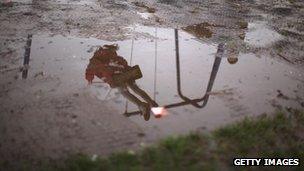Rochdale: Child safety 'not guaranteed' in care homes
- Published

There is a high concentration of children's homes in the north-west of England.
The leader of Rochdale Council says children should no longer be sent to care homes in the borough because their safety "is not being guaranteed".
There are 41 children's homes in Rochdale, which house vulnerable children from all over England.
Colin Lambert says the council has no say in what happens to children in homes who come from outside Rochdale.
Nine men were recently convicted of abusing young girls in Rochdale, one of whom lived in a care home.
Speaking to BBC Radio 4's <link> <caption>The Report</caption> <url href="http://www.bbc.co.uk/programmes/b00jkr1q" platform="highweb"/> </link> , Rochdale Council leader Colin Lambert says he has been worried about the safety of young people in care for some time:
"When you have got as many homes in an authority the size of Rochdale you are grouping together, in a small population, a large number of children who are vulnerable and that is an issue."
Most of Rochdale's 41 children's homes are privately run, and the borough has considerably more homes than other areas of England with comparable populations - the London Borough of Haringey has 9 homes, while Solihull in the West Midlands has just two.
The government says children in care should live within their local authority wherever possible.
Currently, of around 60 young people living in Rochdale's homes, only one child is originally from the borough.
It is good practice for local authorities to inform social services in another region that they are sending a child to live in a home in the area, but the responsibility for the child's care remains with the home authority. This is a source of frustration for Mr Lambert:
"Unless the child is from the Borough of Rochdale we have no say in whether the child should be here, whether the home is providing what it should [and] we get no reports back on how the child is progressing."
"It is a scar and a disgrace on this country's record of caring for vulnerable children."
Children become 'invisible'
Earlier this month nine men from Rochdale were convicted of running a child grooming ring.
Rochdale council leader Colin Lambert says for the time being "you have got to question more vulnerable children being brought into this borough… what we are seeing is a loophole and the safety of children is not being guaranteed."
The north-west of England has the highest concentration of children's homes in the country.
With a quarter of all children's homes in England, the region is a net importer of young people into private residential homes.
Peter Steen, a councillor for Lancashire County Council told The Report this was down to cost:
"The property prices are lower than other parts of the country. Large houses can be picked up reasonably cheaply and converted, all they require is a licence from Ofsted."
Last year Mr Steen chaired an inquiry into Lancashire's 101 children's homes - the highest number of any authority in England.
It found the council and the police had little knowledge of some of the private children's homes in the area. It also estimated 21,000 children - a third of those in care in England - were being cared for in areas outside their home local authority.
Mr Steen says placing vulnerable girls, who are susceptible to grooming, so far away from home, can lead to them slipping through the cracks:
"They can become invisible... no one knows, so they cannot be monitored or helped."
The BBC has also uncovered details of a previously unreported case of grooming for sexual exploitation which Rochdale Council tried to keep secret. It involved a 14-year-old girl who suffered two years of abuse while in the care of the borough.
The social worker assigned to monitor the girl was a trainee and Rochdale Council failed to respond quickly to the girl's claims of escalating abuse.
Eventually, in 2006, the official solicitor representing the government intervened to force the council to step in and take full responsibility. Rochdale Council tried to keep its name from being made public but the judge rejected the request.
Cheryl Eastwood, the director of children's services at Rochdale Council, says there have been significant improvements but admits to mistakes:
"There are things we should have done differently in the past but the issue wasn't well understood nationally, not just in Rochdale."
<bold>Hear more on this story on </bold> <link> <caption>The Report</caption> <url href="http://www.bbc.co.uk/programmes/b00jkr1q" platform="highweb"/> </link> <bold> on Thursday 31, May at 20:00 BST. </bold>
<bold>You can listen again via the Radio 4 </bold> <link> <caption>website</caption> <url href="http://www.bbc.co.uk/programmes/b01j6t1t" platform="highweb"/> </link> <bold> or by downloading The Report </bold> <link> <caption>podcast. </caption> <url href="http://www.bbc.co.uk/podcasts/series/r4report" platform="highweb"/> </link>
- Published25 May 2012
- Published19 May 2012
- Published16 May 2012
- Published17 January 2011